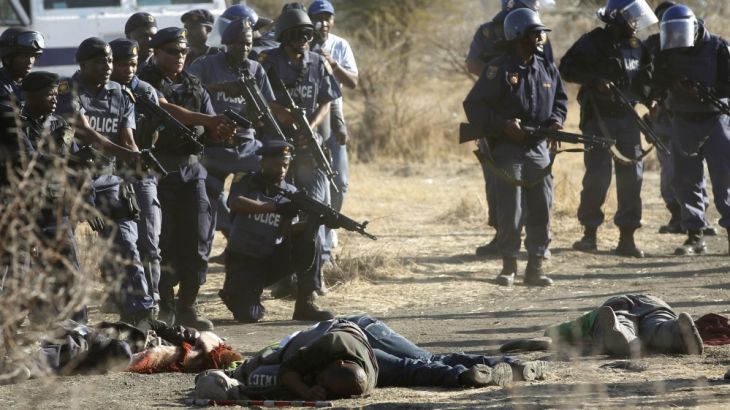Flawed police plan blamed for Marikana massacre
South African President Jacob Zuma releases much-awaited report on police operation in 2012 that killed 34 miners.

The police operation that led to the deaths of at least 34 striking miners in the mining town of Marikana in 2012 was tactically defective, a Commission of Inquiry into the killings has found.
Releasing the commission’s report to the public on Thursday night, South African President Jacob Zuma said: “The commission found that the police operation should not have taken place because of the defects in the [tactical] plan.”
Keep reading
list of 4 itemsAre settler politics running unchecked in Israel?
Post-1948 order ‘at risk of decimation’ amid war in Gaza, Ukraine: Amnesty
UK passes bill to deport asylum seekers to Rwanda: What’s next?
The commission, which was chaired by retired judge Ian Farlam, and appointed by the presidency in August 2012 to investigate the events in Marikana that left 44 people dead during a protracted wage strike, “found that it would have been impossible to disarm and disperse the strikers without significant bloodshed”.
The president said that the commission also found the allegations against Cyril Ramaphosa, now deputy president of the country, for being responsible for the massacre to be “groundless”.
![Cyril Ramaphosa was accused of being responsible for the violent crackdown on striking miners at Marikana [Reuters]](/wp-content/uploads/2015/06/2e2bbab7dbee4409bd5d9a4d22353a6c_18.jpeg)
He said that the police attempt to disarm strikers was almost certainly going to result in “significant bloodshed” and that officials should have waited till the next day to pursue their operation to end the strike action.
The report was originally submitted to the presidency in March 2015, but Zuma said his office needed time to study the findings before releasing it to the public.
So far, government is off the hook, Cyril Ramaphosa off the hooks, unions and Lonmin criticised, blame laid on SAPS #MarikanaReport
— Khadija Patel (@khadijapatel) June 25, 2015
For activists like Trevor Ngwane, from Social Science Research Institute at the University of Johannesburg, the delay was an impediment to justice.
“People who are responsible need to be charged. Those who did it and those who provided the order – need to be charged. We hoping the report clarifies those issues of culpability.”
Isaac Mangena, from the South African Human Rights Commission (SAHRC), told Al Jazeera that it was only a matter of time until the report was going to be released and that the commission would be studying the report in detail.
Families and miners crowded round laptop trying to watch #marikanareport – no TV working. Total mess. pic.twitter.com/KSk0SJg610
— LaurenCliffordHolmes (@LaurenCHolmes) June 25, 2015
Zuma has been under immense pressure since the report was submitted to him in March, with activists and opposition parties criticising his administration for not releasing the findings of the report. He had initially promised that the report would be released within a month.
But South Africans have been scepticalabout the report. South Africa has seen a surge in police brutality and many activists feel that though Marikana turned the spotlight on the police, little will change. On Thursday, Zuma said the commission recommended a full investigation into the police officers involved.
Among those pointed to for fuelling the tragedy was the mining company Lonmin, which was also criticised for failing to engage workers on their wage demands. Senior police officials, including the former police minister Nathi Mthethwa and national police commissioner Riah Phiyega – who have been widely criticised for their role – were left unscathed by the findings of the report.